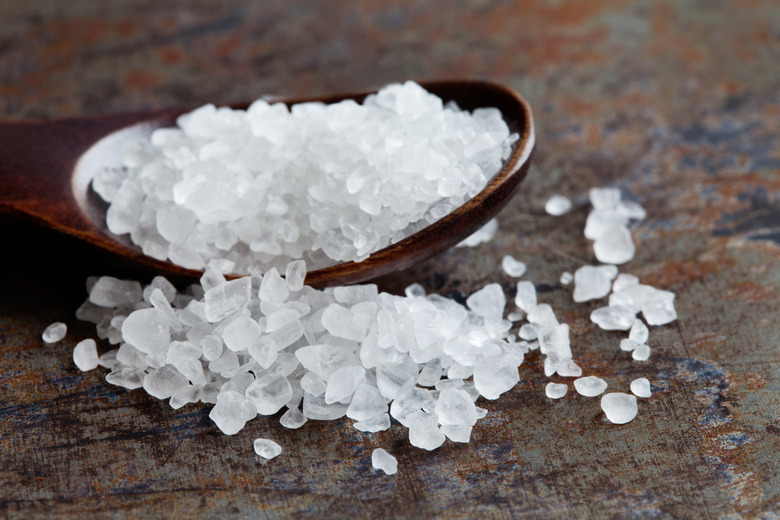Why Does Rock Salt Make Ice Colder?
Place a cup containing pure water next to one containing salty water and gradually lower the ambient temperature. At around 0 degrees Celsius (32 degrees Fahrenheit) the pure water will ice over and gradually freeze while the salty water remains liquid. At a certain temperature below that at which the fresh water froze, the salt water will also freeze. The actual temperature difference depends on the salt concentration. The reason this happens has to do with the presence of salt ions in the water. They physically interfere with the tendency of the water molecules to line up into a crystal structure.
TL;DR (Too Long; Didn't Read)
Salty water has a lower freezing point than pure water. The water on the surface of salty ice is colder, so the ice feels colder than pure water ice.
What Happens When Water Freezes?
What Happens When Water Freezes?
Each water molecule is a combination of one oxygen and two hydrogen atoms arranged in a triangle. This asymmetric arrangement gives the molecule a polarity – one side has a net positive charge while the other side is negative. Because of this polarity, the molecules are attracted to each other. The molecules are in constant motion, however, vibrating and moving around each other ceaselessly. When you lower the temperature, the molecules slow down, and because they have less energy, they start sticking to each other. At the freezing point, the energy of movement is so low that the molecules coalesce into a solid structure.
Add Some Salt
Add Some Salt
Sodium chloride (NaCl), or rock salt, consists of a positively charged sodium ion and a negative chlorine ion bound together by electrostatic attraction into a lattice structure. When you put the salt in water, the polar water molecules break the structure and surround the individual ions, which disperse into solution. When the temperature goes down, the ions interfere with the ability of the water molecules to form a crystal structure, and the mixture won't turn into a solid until you lower the temperature below the freezing point of pure water. The new freezing point depends on the salt concentration, but the lowest it can go is -21.1 C (-5.98 F).This occurs at saturation, when no more salt will dissolve.
Ice With a Lower Freezing Point Feels Colder
Ice With a Lower Freezing Point Feels Colder
If you pick up a frozen cube of salt water, it might feel colder than a cube of pure water. There are a couple of reasons for this. One is that, to be frozen, a salt water ice cube has to be at a lower temperature than a pure water ice cube.
The other reason is that the surface layer of water on the cube is also at a lower temperature. On the surface of every ice cube, an exchange process goes on between water in the liquid and solid states. The presence of salt in the water lowers the equilibrium point of this exchange by lowering the freezing point of the liquid water. Consequently, the water you feel on the surface of a salt water cube is colder that that on a pure water cube. This dynamic also prevents water that comes in contact with the ice from freezing, which is why salt appears to melt ice.
Cite This Article
MLA
Deziel, Chris. "Why Does Rock Salt Make Ice Colder?" sciencing.com, https://www.sciencing.com/rock-salt-make-ice-colder-5207350/. 27 April 2018.
APA
Deziel, Chris. (2018, April 27). Why Does Rock Salt Make Ice Colder?. sciencing.com. Retrieved from https://www.sciencing.com/rock-salt-make-ice-colder-5207350/
Chicago
Deziel, Chris. Why Does Rock Salt Make Ice Colder? last modified March 24, 2022. https://www.sciencing.com/rock-salt-make-ice-colder-5207350/
